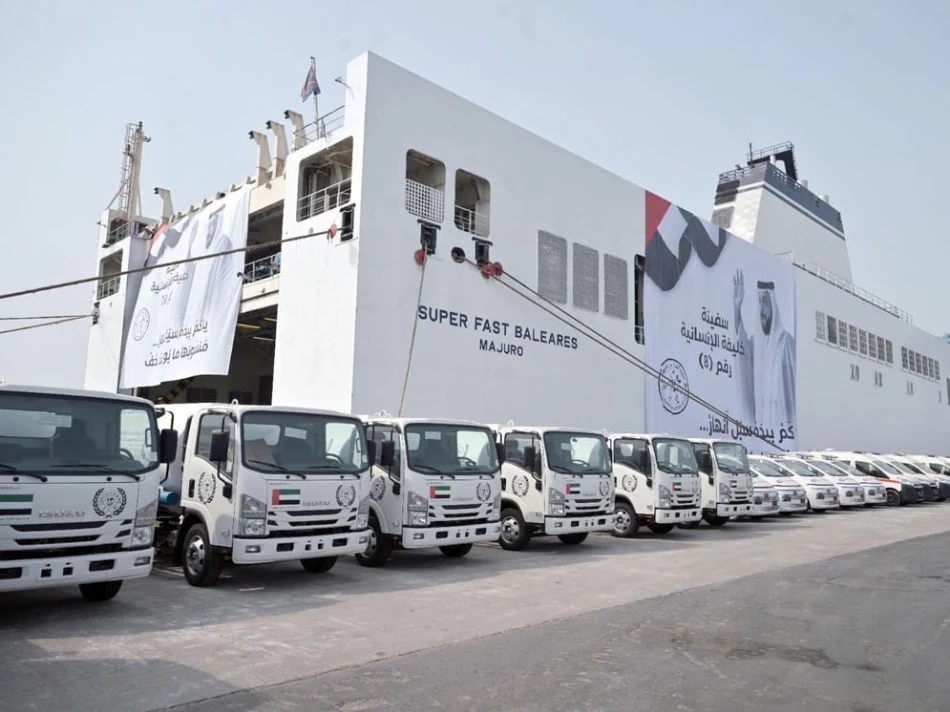
Humanitarian Lifeline Departs UAE, Delivering 7,166 Tons of Emergency Aid to Gaza
UAE Delivers Largest Humanitarian Aid Shipment Yet to Gaza as Regional Crisis Deepens
The United Arab Emirates has dispatched its eighth and largest humanitarian aid vessel to Gaza, carrying over 7,000 tons of critical supplies as part of its expanding "Noble Knight 3" operation. The shipment underscores the UAE's growing role as a regional humanitarian leader while highlighting the escalating scale of Gaza's crisis, with total UAE aid now exceeding 77,000 tons.
Record-Breaking Aid Delivery Signals Worsening Conditions
The Khalifa humanitarian ship departed from Abu Dhabi's Khalifa Port (KEZAD) bound for Egypt's Al-Arish port, from where the supplies will be transported into Gaza. At 7,166 tons, this single shipment represents the largest humanitarian cargo the UAE has sent to the Palestinian territory to date.
The vessel's cargo breakdown reveals the desperate needs on the ground: 4,372 tons of food supplies, 1,433 tons of shelter materials, 860 tons of medical supplies, and 501 tons of health materials. This massive shipment brings the UAE's total humanitarian aid to Gaza to 77,266 tons since the current crisis began.
Strategic Humanitarian Positioning
The UAE's sustained aid campaign positions the nation as a key humanitarian player in the Middle East, complementing its broader diplomatic strategy. Unlike direct military intervention, humanitarian aid allows the UAE to maintain relationships across the region while demonstrating tangible support for Palestinian civilians.
Logistical Challenges and Regional Coordination
The routing through Egypt's Al-Arish port reflects the complex logistics required to deliver aid to Gaza. This approach mirrors strategies used by other international donors, including the European Union and various UN agencies, who rely on Egyptian cooperation to access the blockaded territory.
The UAE's ability to consistently deliver large-scale shipments demonstrates sophisticated supply chain management and strong diplomatic coordination with Cairo. This operational capacity could prove valuable for future humanitarian crises in the region.
Broader Implications for Gulf Diplomacy
The "Noble Knight 3" operation represents more than humanitarian assistance—it's a diplomatic tool that allows the UAE to maintain influence in Palestinian affairs without direct political confrontation. This approach aligns with the UAE's broader foreign policy of pragmatic engagement across regional divides.
Economic and Soft Power Benefits
For the UAE, sustained humanitarian leadership builds soft power credentials that complement its economic diversification strategy. The operation showcases the country's logistical capabilities and reinforces its image as a responsible regional power, potentially attracting international partnerships and investment.
The scale and consistency of these shipments also demonstrate the UAE's financial capacity to sustain long-term humanitarian commitments, distinguishing it from nations that provide only sporadic aid during acute crises.
Setting Precedent for Regional Response
The UAE's systematic approach to Gaza aid—with numbered operations and regular large-scale shipments—establishes a template for sustained humanitarian intervention that other Gulf states may follow. This methodical strategy contrasts with ad-hoc emergency responses and suggests long-term planning for ongoing regional instability.
As the humanitarian situation in Gaza continues to deteriorate, the UAE's expanding aid operations signal both the severity of the crisis and the Emirates' commitment to maintaining a prominent role in regional affairs through humanitarian channels.
Most Viewed News

 Sara Khaled
Sara Khaled






